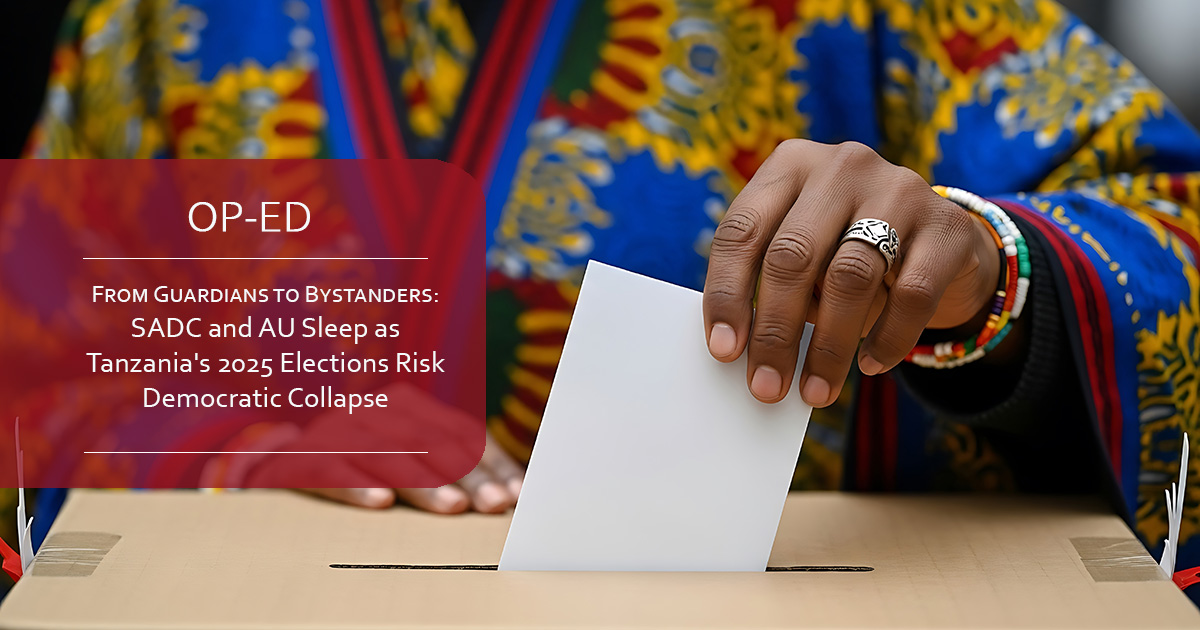By Tendai Mbanje & Tito Magoti
As Tanzanians brace for the October 2025 general elections, the country finds itself at a perilous juncture. Once hailed for its peaceful transitions and political maturity, Tanzania is now witnessing a quiet but dangerous erosion of democratic norms. The silence from regional bodies like the Southern African Development Community (SADC) and the African Union (AU) in the face of mounting electoral concerns is not merely a lapse in oversight it is a form of complicity that erodes the very democratic norms these institutions were created to uphold
As Tanzania approaches its 2025 elections, the warning signs are unmistakable. These include opposition suppression, stalled electoral reforms, and the resurgence of authoritarian tactics reminiscent of the Magufuli era. Yet, despite these red flags, regional actors continue to offer diplomatic platitudes, effectively legitimizing a process that risks disenfranchising millions of voters. This abdication of responsibility transforms guardians of democracy into passive bystanders and in doing so, signals to other regimes that democratic backsliding will be met not with scrutiny, but with silence.
A few years back, after a brief period of optimism following President Samia Suluhu Hassan’s early gestures toward political openness in March 2021, the tide turned. The government's recent actions, marked by the arrest of opposition leader Tundu Lissu on treason charges, the banning of the main opposition party Chama cha Demokrasia na Maendeleo (CHADEMA) from participating in the elections for the next five years, and the subsequent suspension from conducting political activities pending the determination of a civil lawsuit on account of uneven distribution of party assets between Tanzania mainland and Zanzibar, and the violent suppression of dissent, signal a return and perfection of the repressive tactics of the President John Pombe Magufuli era.
The use of cybercrimes, anti-terrorism, and treason laws to silence critics, the brutal treatment of opposition supporters, and the systematic denial of access to legal proceedings all point to a state apparatus more concerned with consolidating power than safeguarding democratic participation. The Independent National Electoral Commission (INEC), far from being a neutral arbiter, has been accused of acting unilaterally and without transparency, most notably in its decision to bar CHADEMA from the ballot. Equally, the judiciary of Tanzania has been instrumentalised to persecute political dissidents and authorise a suspension on CHADEMA from pursuing its political activities.
Voter registration efforts, while technologically upgraded, have been marred by opposition boycotts and public scepticism. The CHADEMA’s “No Reform, No Election” campaign reflects a broader sentiment that without meaningful electoral reforms, participation is futile. Despite INEC’s claims of progress, the legitimacy of the process is undercut by the exclusion of key political actors and the absence of a level playing field. As of now, with three months remaining until the polls, the number of voters has not been announced, and the timeline for the political and electoral processes, such as campaigns and the actual voting day, remains uncertain.
Meanwhile, campaign financing remains opaque. The government has committed over 1 trillion Tanzanian shillings to fund the elections entirely from domestic resources. Yet, there is little transparency on how these funds are allocated, and opposition parties allege that state resources are being used to entrench the ruling Chama Cha Mapinduzi (CCM) party’s dominance.
Questions concerning electoral dispute resolution continue to be of significant importance, with Tanzania maintaining a law that prohibits challenging presidential election results in court despite an order from the African Court on Human and Peoples’ Rights to amend such practices. Similarly, independent candidates remain prohibited from running for office.
Furthermore, the lack of confidence in the electoral dispute resolution process was exemplified by a notable incident among numerous concerns regarding the 2020 election, where only one parliamentary dispute was filed with the High Court of Tanzania. However, it was dismissed for not meeting procedural requirements after the litigant was required to pay security for costs amounting to TZS 12,000,000/-. These shortcomings portray a picture of a dysfunctional judicial system amid widespread calls for electoral justice in Tanzania.
Significant concerns mount regarding the involvement of the police in the electoral process. The Police Chief has already been issuing threats to the public about potential repercussions for those who would ‘disrupt peace’ during the election. Yet, a ton of incidents of police brutality, enforced disappearances, torture and extrajudicial killings of government critics, religious leaders, and human rights defenders remain unaccounted for. The situation might worsen as the electoral clock ticks.
Tanzania’s democratic backslide is not occurring in a vacuum. It is unfolding under the watch of regional institutions that have yet to raise a meaningful alarm. Their inaction emboldens authoritarian tendencies and betrays the very principles they claim to uphold.
Tanzania's 2025 elections risk becoming a procedural formality rather than a genuine democratic contest. If SADC, the AU, and electoral oversight bodies such as the African Centre for Governance and the European Union continue to sleep through this moment, they will not only fail Tanzania but also fail the region.


